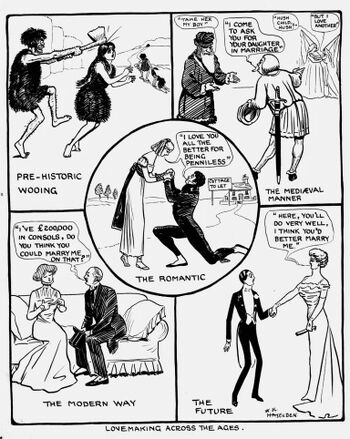
"Lovemaking across the ages", Daily Mirror, 1909
William Kerridge Haselden was born on 3 December 1872 in Seville, Spain, son of Adolphe Henry Haselden, a civil engineer who was director of the Seville gasworks, and his wife Susan Elizabeth, née Kerridge. His father died of pneumonia in 1878 on a visit to England, and the family stayed there, settling in Hampstead, living off business interests. Haselden was sent to a private school in Carlton Hill, St. John's Wood, London, but the family ran short of money and he left at 16 with no formal art training.
He worked unhappily as an underwriter at Lloyd's of London for thirteen years, before his drawings started to be accepted for publication in 1902, beginning in The Sovereign, where he briefly joined the staff, drawing political cartoons and theatrical sketches. The Sovereign folded in 1903, and he worked freelance for The Tatler and the St. James' Gazette for a while, before finding a full-time post on the staff of Alfred Harmsworth's new paper, the Daily Mirror, where he remained the rest of his working life
He started out drawing political cartoons, but by 1906 had established his own niche, based on gentle social satire, lampooning fashion and middle-class manners. He divided his cartoons up into a number of panels, and for that he is regarded as the father of the British strip cartoon. His Mirror cartoons were collected in 29 volumes of Daily Mirror Reflections from 1906 to 1935. While working at the Mirror, he also contributed theatre caricatures to Punch from 1906 to 1936.
In 1907 he married Eleanor Charlotte Lane-Bayliff (1875–1944). They had two children, Celia Mary and John Kerridge.
During the First World War many of his cartoons featured the adventures of Big and Little Willie, caricatures of Kaiser Wilhelm and his son, Crown Prince Wilhelm. These were collected as The Sad Adventures of Big and Little Willie in 1915. The same year, the British prototype tank was named "Little Willie". Other wartime characters included Joy Flapperton, a fashionable young woman, and Colonel Dugout, a stuffy government administrator.
He spent most of his working life in London, but from the mid-1930s spend more time at the family holiday home in Aldborough, Suffolk. He retired to Aldborough in 1940, and died there on 25 December 1953.
References[]
- David James Little, ‘Haselden, William Kerridge (1872–1953)’, Oxford Dictionary of National Biography, Oxford University Press, 2004; online edn, Oct 2007, accessed 22 July 2013
- Bio at British Cartoon Archive